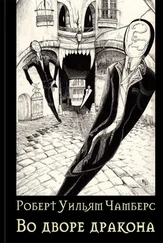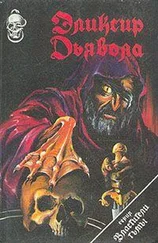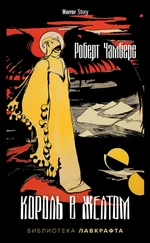"Professor Kemper? He's setting up the folding cage—"
With a screech that raised my hair, Grue whipped out his murderous knife and hurled himself backward at Kemper, but the latter shrank aside behind the partly erected cage, and Grue whirled around, snarling, hacking, and even biting at the wood frame and steel bars.
And then occurred a thing so horrid that it sickened me to the pit of my stomach; for the man's sagging straw hat had fallen off, and there, in the back of his head, through the coarse, black, ratty hair, I saw a glassy eye glaring at me.
"Kemper!" I shouted. "He's got a third eye! He's one of them! Knock him flat with your riflestock!" And I seized a shot–gun from the top of the baggage bundle on the ground beside me, and leaped at Grue, aiming a terrific blow at him.
"'Kemper!' I shouted…. 'He is one of them! Knock him flat with your riflestock!'"
But the glassy eye in the back of his head was watching me between the clotted strands of hair, and he dodged both Kemper and me, swinging his heavy knife in circles and glaring at us both out of the front and back of his head.
Kemper seized him by his arm, but Grue's shirt came off, and I saw his entire body was as furry as an ape's. And all the while he was snapping at us and leaping hither and thither to avoid our blows; and from the corners of his puffed cheeks he whined and whimpered and mewed through the saliva foam.
"Keep him from the water!" I panted, following him with clubbed shot–gun; and as I advanced I almost stepped on a soiled heap of foulness—the dead buzzard which he had caught and worried to death with his teeth.
Suddenly he threw his knife at my head, hurling it backward; dodged, screeched, and bounded by me toward the shore of the lagoon, where the pretty waitress was standing, petrified.
For one moment I thought he had her, but she picked up her skirts, ran for the nearest boat, and seized a harpoon; and in his fierce eagerness to catch her he leaped clear over the boat and fell with a splash into the lagoon.
As Kemper and I sprang aboard and looked over into the water, we could see him going down out of reach of a harpoon; and his body seemed to be silver–plated, flashing and glittering like a burnished eel, so completely did the skin of air envelope him, held there by the fur that covered him.
And, as he rested for a moment on the bottom, deep down through the clear waters of the lagoon where he lay prone, I could see, as the current stirred his long, black hair, the third eye looking up at us, glassy, unwinking, horrible.
* * * * *
A bubble or two, like globules of quicksilver, were detached from the burnished skin of air that clothed him, and came glittering upward.
Suddenly there was a flash; a flurrying cloud of blue mud; and Grue was gone.
* * * * *
After a long while I turned around in the muteness of my despair. And slowly froze.
For the pretty waitress, becomingly pale, was gathered in Kemper's arms, her cheek against his shoulder. Neither seemed to be aware of me.
"Darling," he said, in the imbecile voice of a man in love, "why do you tremble so when I am here to protect you? Don't you love and trust me?"
"Oo—h—yes," she sighed, pressing her cheek closer to his shoulder.
I shoved my hands into my pockets, passed them without noticing them, and stepped ashore.
And there I sat down under a tree, with my back toward them, all alone and face to face with the greatest grief of my life.
But which it was—the loss of her or the loss of Grue, I had not yet made up my mind.
As everybody knows, the great majority of Americans, upon reaching the age of natural selection, are elected to the American Institute of Arts and Ethics, which is, so to speak, the Ellis Island of the Academy.
Occasionally a general mobilization of the Academy is ordered and, from the teeming population of the Institute, a new Immortal is selected for the American Academy of Moral Endeavor by the simple process of blindfolded selection from Who's Which .
The motto of this most stately of earthly institutions is a peculiarly modest, truthful, and unintentional epigram by Tupper:
"Unknown, I became Famous; Famous, I remain Unknown."
And so I found it to be the case; for, when at last I was privileged to write my name, "Smith, Academician," I discovered to my surprise that I knew none of my brother Immortals, and, more amazing still, none of them had ever heard of me.
This latter fact became the more astonishing to me as I learned the identity of the other Immortals.
Even the President of our great republic was numbered among these Olympians. I had every right to suppose that he had heard of me. I had happened to hear of him, because his Secretary of State once mentioned him at Chautauqua.
It was a wonderfully meaningless sensation to know nobody and to discover myself equally unknown amid that matchless companionship. We were like a mixed bunch of gods, Greek, Norse, Hindu, Hottentot—all gathered on Olympus, having never heard of each other but taking it for granted that we were all gods together and all members of this club.
My initiation into the Academy had been fixed for April first, and I was much worried concerning the address which I was of course expected to deliver on that occasion before my fellow members.
It had to be an exciting address because slumber was not an infrequent phenomenon among the Immortals on such solemn occasions. Like dozens of dozing Joves a dull discourse always set them nodding.
But always under such circumstances the pretty ushers from Barnard College passed around refreshments; a suffragette orchestra struck up; the ushers uprooted the seated Immortals and fox–trotted them into comparative consciousness.
But I didn't wish to have my inaugural address interrupted, therefore I was at my wits' ends to discover a subject of such exciting scientific interest that my august audience could not choose but listen as attentively as they would listen from the front row to some deathless stunt in vaudeville.
That morning I had left the Bronx rather early, hoping that a long walk might compose my thoughts and enable me to think of some sufficiently entertaining and unusual subject for my inaugural address.
I walked as far as Columbia University, gazed with rapture upon its magnificent architecture until I was as satiated as though I had arisen from a banquet at Childs'.
To aid mental digestion I strolled over to the noble home of the Academy and Institute adjoining Mr. Huntington's Hispano–Moresque Museum.
It was a fine, sunny morning, and the Immortals were being exercised by a number of pretty ushers from Barnard.
I gazed upon the impressive procession with pride unutterable; very soon I also should walk two and two in the sunshine, my dome crowned with figurative laurels, cracking scientific witticisms with my fellow inmates, or, perhaps, squeezing the pretty fingers of some—But let that pass.
I was, as I say, gazing upon this inspiring scene on a beautiful morning in February, when I became aware of a short and visibly vulgar person beside me, plucking persistently at my elbow.
"Are you the great Academician, Perfessor Smith?" he asked, tipping his pearl–coloured and somewhat soiled bowler.
"Yes," I said condescendingly. "Your description of me precludes further doubt. What can I do for you, my good man?"
"Are you this here Perfessor Smith of the Department of Anthropology in the Bronx Park Zoölogical Society?" he persisted.
"What do you desire of me?" I repeated, taking another look at him. He was exceedingly ordinary.
"Prof, old sport," he said cordially, "I took a slant at the papers yesterday, an' I seen all about the big time these guys had when you rode the goat—"
Читать дальше












